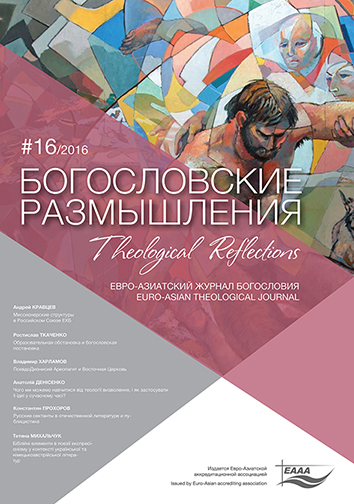What Can we Learn from Liberation Theology and how can its Ideas be Applied in Modern Times
DOI:
https://doi.org/10.29357/issn.2521-179X.2016.16.155Keywords:
Liberation Theology, Ukrainian theological discourse, Dialogue between society and religious communities, Latin American theology, Transformation of traditional religious institutions and practices of ChristianityAbstract
The purpose of this article on the basis of sources on liberation theology is to identify, analyze, and summarize the nature of this branch of theology, while emphasizing the practical problems of the church. As a methodological framework, the author analyzed primary sources of Latin American theology, which allows the reader to consider more deeply the theological and socio-cultural features of liberation theology. The paper is original in that the author puts new names and ideas into Ukrainian theological discourse, addresses key works of the representatives of liberation theology, and promotes a different approach to theology, hermeneutics, and missiology. Liberation theology is presented here as a method by which it is possible to conduct a kind of discourse on almost all theological and social topics of the Christian life. In conclusion, the author states that although liberation theology is inextricably linked to leftist ideology, it causes intense debate in the scholarly and especially the theological environment. Despite the availability of a wide range of interpretations of the new movement, one cannot ignore the religious significance of this innovative movement. Recognition of the potential of liberation theology leads to the actualization of the transformation of traditional religious institutions and practices of Christianity. Liberation theology opens up new possibilities for dialogue between society and religious communities, and the new socio-cultural situation in Ukraine proves that this version of theology is more than relevant todayReferences
- Batey, R. Jesus and the Poor. New York: Harper &Row, Publishers, 1972.
- Berryman, P. Liberation Theology. New York: Pantheon Books, 1987.
- Boff, L. Jesus Christ Liberator. A Critical Christology of our Time. London: SPCK, 1980.
- Boff, L. and C. Boff. “How to be Christians in a World of Destitution.” In Introducing Liberation Theology. <http://www.landreform.org/boff2.htm>.
- Brown, McAfee. A Theology in a New Key. Philadelphia: The Westminster Press, 1978.
- Chopp, R. “Latin American Liberation Theology.” In D. Ford, ed., The Modern Theologians, 409-425. Oxford: Blackwell Publisher, 1997.
- Cooper, T. Reemergence of Liberation Theologies. Models for the Twenty-First Century. - New York: Palgrave Macmillan, 2013.
- Costas, O. Theology of the Crossroads in Contemporary Latin America. Amsterdam: Rodopi, 1976.
- Cunningham, L. “Get Your Faith Off the Shelf.” U.S. Catholic. May 1997: 62-65.
- Dunnam, M. “Exodus.” In L. Ogilvie, ed. The Communicator’s Commentary. Waco: Word Books, 1987.
- Dyrness, W. Learning about Theology from the Third World. Grand Rapids: Academia Books, 1990.
- Ellul, J. Hope in the Time of Abandonment. New York: The Seabury Press, 1977.
- Enns, R. “Exodus.” In T. Alexander and B. Rosner, eds. New Dictionary of Biblical Theology. Downers Grove: InterVarsity Press, 2000.
- Escobar, S. La Fe Evangelica y las Teologias de la Liberacion. El Paso, Texas: Casa Bautista. 1987.
- Gentz, W. “Liberation Theology.” In W. Gentz, ed. The Dictionary of Bible and Religion. Nashville: Abingdon Press, 1986.
- Grudem, W. Systematic Theology. Grand Rapids: Zondervan Publishing House, 1994.
- Gutierrez, G. “The Violence of a System.” In D. Pohier and J. Mieth, eds. Concilium Christian Ethics and Economics: The North – South Conflict. Edinburgh: T.&T. Clark LTD, 1980.
- ____________. “Liberation Theology.” Theology Digest. Vol. 35, No. 1 (Spring 1988).
- ____________. A Theology of Liberation. History, Politics and Salvation. New York: Orbis Books, 1988.
- Hebblethwaute, P. “Let My People Go: the Exodus and Liberation Theology.” Religion, State and Society. Vol. 21, No. 1 (1993).
- Herzog, F. Liberation Theology. New York: The Seabury Press, 1972.
- Petrella, I. “Latin America Liberation Theology. Past, Present, Future,” xi-xxii. In Ivan Petrella ed. Latin American Liberation Theology. Next Generation. Maryknoll: Orbis Books, 2005.
- ____________. The Future of Liberation Theology. An Argument and Manifesto. London: SCM Press, 2006.
- Reel, M. “An Abiding Faith in Liberation Theology.” Washington Post Foreign Service. Monday, May 2, 2005.
- West, G. “The Bible and the Poor: A New Way of Doing Theology.” In C. Rowland, ed. The Cambridge Companion to Liberation Theology. New York: Orbis Books, 1973.
Downloads
How to Cite
Issue
Section
License
Copyright (c) 2020 Anatoliy DENYSENKO

This work is licensed under a Creative Commons Attribution-NonCommercial 4.0 International License.
All articles published in the Journal are distributed under a Creative Commons Attribution-NonCommercial 4.0 International License
By submitting an article for publication in Theological Reflections: Eastern European Journal of Theology the author grants the editors the right to publish the article and distribute it in electronic and print form.
The author reserves all copyrights and the right to use the materials of the article in whole or in part for educational purposes, to write his own dissertations, to prepare abstracts, conference reports, oral presentations, etc., as well as post electronic copies of articles (including the final electronic version downloaded from the journal’s official website) on non-commercial web-resources without the consent of the editorial board and founders.



